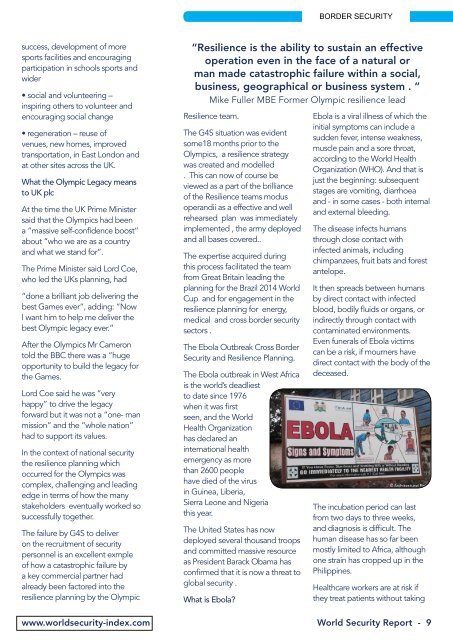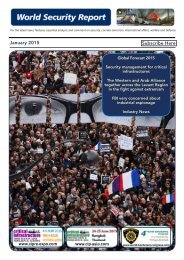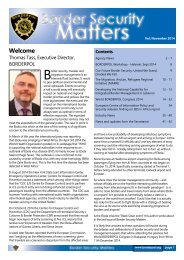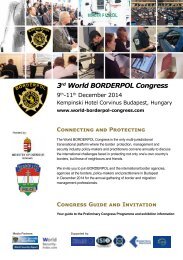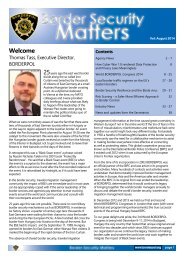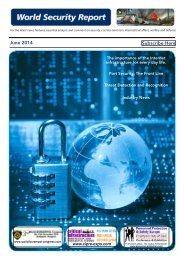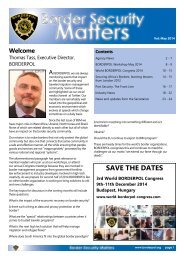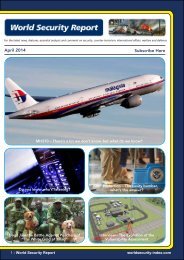September 2014 Subscribe Here
World Security Report September 2014
World Security Report September 2014
Create successful ePaper yourself
Turn your PDF publications into a flip-book with our unique Google optimized e-Paper software.
BORDER SECURITY<br />
success, development of more<br />
sports facilities and encouraging<br />
participation in schools sports and<br />
wider<br />
• social and volunteering –<br />
inspiring others to volunteer and<br />
encouraging social change<br />
• regeneration – reuse of<br />
venues, new homes, improved<br />
transportation, in East London and<br />
at other sites across the UK.<br />
What the Olympic Legacy means<br />
to UK plc<br />
At the time the UK Prime Minister<br />
said that the Olympics had been<br />
a “massive self-confidence boost”<br />
about “who we are as a country<br />
and what we stand for”.<br />
The Prime Minister said Lord Coe,<br />
who led the UKs planning, had<br />
“done a brilliant job delivering the<br />
best Games ever”, adding: “Now<br />
I want him to help me deliver the<br />
best Olympic legacy ever.”<br />
After the Olympics Mr Cameron<br />
told the BBC there was a “huge<br />
opportunity to build the legacy for<br />
the Games.<br />
Lord Coe said he was “very<br />
happy” to drive the legacy<br />
forward but it was not a “one- man<br />
mission” and the “whole nation”<br />
had to support its values.<br />
In the context of national security<br />
the resilience planning which<br />
occurred for the Olympics was<br />
complex, challenging and leading<br />
edge in terms of how the many<br />
stakeholders eventually worked so<br />
successfully together.<br />
The failure by G4S to deliver<br />
on the recruitment of security<br />
personnel is an excellent exmple<br />
of how a catastrophic failure by<br />
a key commercial partner had<br />
already been factored into the<br />
resilience planning by the Olympic<br />
www.worldsecurity-index.com<br />
“Resilience is the ability to sustain an effective<br />
operation even in the face of a natural or<br />
man made catastrophic failure within a social,<br />
business, geographical or business system . “<br />
Mike Fuller MBE Former Olympic resilience lead<br />
Resilience team.<br />
The G4S situation was evident<br />
some18 months prior to the<br />
Olympics, a resilience strategy<br />
was created and modelled<br />
. This can now of course be<br />
viewed as a part of the brilliance<br />
of the Resilience teams modus<br />
operandii as a effective and well<br />
rehearsed plan was immediately<br />
implemented , the army deployed<br />
and all bases covered..<br />
The expertise acquired during<br />
this process facilitated the team<br />
from Great Britain leading the<br />
planning for the Brazil <strong>2014</strong> World<br />
Cup and for engagement in the<br />
resilience planning for energy,<br />
medical and cross border security<br />
sectors .<br />
The Ebola Outbreak Cross Border<br />
Security and Resilience Planning.<br />
The Ebola outbreak in West Africa<br />
is the world’s deadliest<br />
to date since 1976<br />
when it was first<br />
seen, and the World<br />
Health Organization<br />
has declared an<br />
international health<br />
emergency as more<br />
than 2600 people<br />
have died of the virus<br />
in Guinea, Liberia,<br />
Sierra Leone and Nigeria<br />
this year.<br />
The United States has now<br />
deployed several thousand troops<br />
and committed massive resource<br />
as President Barack Obama has<br />
confirmed that it is now a threat to<br />
global security .<br />
What is Ebola?<br />
Ebola is a viral illness of which the<br />
initial symptoms can include a<br />
sudden fever, intense weakness,<br />
muscle pain and a sore throat,<br />
according to the World Health<br />
Organization (WHO). And that is<br />
just the beginning: subsequent<br />
stages are vomiting, diarrhoea<br />
and - in some cases - both internal<br />
and external bleeding.<br />
The disease infects humans<br />
through close contact with<br />
infected animals, including<br />
chimpanzees, fruit bats and forest<br />
antelope.<br />
It then spreads between humans<br />
by direct contact with infected<br />
blood, bodily fluids or organs, or<br />
indirectly through contact with<br />
contaminated environments.<br />
Even funerals of Ebola victims<br />
can be a risk, if mourners have<br />
direct contact with the body of the<br />
deceased.<br />
The incubation period can last<br />
from two days to three weeks,<br />
and diagnosis is difficult. The<br />
human disease has so far been<br />
mostly limited to Africa, although<br />
one strain has cropped up in the<br />
Philippines.<br />
Healthcare workers are at risk if<br />
they treat patients without taking<br />
World Security Report - 9


